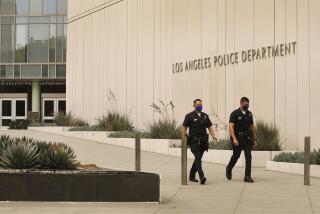LAPD investigates 4 missing persons cases as a result of Grim Sleeper photos
- Share via
Los Angeles police detectives said Thursday they are investigating at least four missing persons cases as a result of publicizing photos seized from the South Los Angeles property of Lonnie Franklin Jr., the Grim Sleeper serial slaying suspect.
The Los Angeles Police Department received hundreds of phone calls, e-mails and other tips last month after releasing about 180 photographs of unidentified women that were found in a trailer and garage belonging to Franklin.
Franklin, 57, is charged with 10 counts of murder and one count of attempted murder — crimes that occurred in South L.A. and spanned three decades, prosecutors said. Franklin has pleaded not guilty.
Thus far, at least 53 women depicted in the photos have been identified by LAPD Robbery-Homicide detectives.
At least 79 photos have been removed from the LAPD website after relatives, friends or the women in them contacted police to confirm their identities.
LAPD officials would not discuss details of the four missing persons cases other than to say they dated back to the early 1990s. Two of the missing women appeared in the photographs found in Franklin’s possessions, and the two other missing person cases surfaced as a result of the publicity surrounding release of the photos, police said.
“We know who they are. They can’t be located. They haven’t been seen in a substantial amount of time,” said Det. Dennis Kilcoyne, who is spearheading the investigation.
In addition to the missing women, police are examining at least 30 unsolved killings for any links to Franklin.
At the time of Franklin’s arrest in July, authorities found about 1,000 photographs and hundreds of hours of video of women.
Some of the images appeared to have been innocent snapshots, but many showed women in more risque poses. The materials spanned several decades, dating back to the 1980s, and included video and digital camera images, Polaroids, conventional prints and even undeveloped film.
The primary motivation for releasing the images was to find out whether the women were alive and well, Kilcoyne said. But detectives also have received more than 200 tips that ultimately could prove important to prosecuting Franklin, he said.
Franklin’s attorney, Louisa Pensanti, was critical of the LAPD for releasing the photos and said more than a dozen of the women were relatives or friends. Pensanti returned a call but did not immediately comment on the case.
More to Read
Sign up for Essential California
The most important California stories and recommendations in your inbox every morning.
You may occasionally receive promotional content from the Los Angeles Times.













